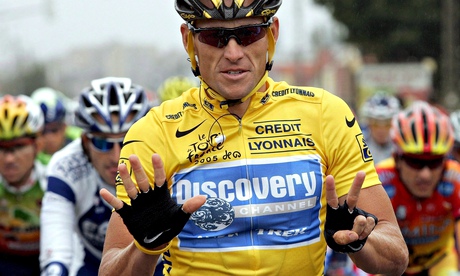
Here is a striking but flawed documentary by Alex Gibney, famous for his studies of financial fraud in Enron: The Smartest Guys in the Room (2005) and America's use of rendition in Taxi to the Dark Side (2007). He paints a portrait of the disgraced cyclist Lance Armstrong, who admits to drug use with the same calm, clear-eyed candour he once displayed while denying it. Yet the slippery doper hedges his general admission with all sorts of hints that this matter wasn't quite what his accusers have said, and Gibney circles around his man, never quite going in for the kill.
The film is a lesson in the perils of getting caught in the middle of a story – and creating and believing in a "story" in the first place. Armstrong was spinning us a simple tale of innocence. Gibney was preparing to spin something more complicated. The spokes got tangled up. Gibney extricates himself from the wreckage, but only just.
This is far from being Armstrong's movie debut. That came in 2004, with his cameo in the comedy Dodgeball, in which Vince Vaughn plays an idle gym owner managing a dodgeball team of lovable underdogs. Just as Vaughn is about to quit on his loyal band, he encounters Armstrong, who shames him into staying the course. It is worth remembering just how embedded in US pop culture Armstrong had become – in this case, a comically obvious symbol of honesty and courage. (Gibney doesn't mention the Dodgeball cameo, but shows satirist Jon Stewart admitting to being taken in by Armstrong's lies.)
The film starts with Oprah Winfrey's excruciating 2013 TV interview with Armstrong, in which he blankly confesses. His manner is strangely unrepentant and matter-of-fact; we see a handsome, drawn, grey-haired man with a weird look of Tony Blair.
Way before this, Armstrong had been a national hero for surviving cancer and winning the Tour de France a sensational seven consecutive times from 1999 to 2005. Far from calling those victories into question, his illness only made them seem more seductively miraculous. The mounting drug investigations against him could never quite be proven.
Gibney became involved when Armstrong defiantly decided to have another crack at the Tour de France in 2009, submitting to the fierce anti-doping inspections and achieving a very creditable third place.
Gibney was allowed unprecedented access, and appeared to be making a rather sympathetic human-interest film, to the horror of Armstrong's critics. But soon after photography was complete, Armstrong's continued drug abuse was exposed, and Gibney had to re-edit and reshape all his footage to make it fit this new picture. He was allowed just one hurried post-confession interview – a derisory snatch of evasive blather, which makes all of Gibney's intimate pre-confession interviews look creepy and pointless. The awful truth was that Gibney had allowed himself to be taken in, and – had he not been overtaken by events – he might inadvertently have been the liar's most prestigious defender.
Well, it can happen to any journalist. And Gibney does in fact salvage a watchable study of a fanatically arrogant competitor who isn't above all sorts of tricks, gamesmanship, grudgery and macho legal bullying to win at all costs and cover up the truth at all costs. It is quite clear that Armstrong took drugs in the same spirit in which a Hollywood actor has minor cosmetic surgery – sure, it isn't the "truth" about my face, but everyone else is doing it, and my basic talent is what's important.
How exactly had Gibney imagined his film working out initially? He may well have thought that, as the Armstrong story was effectively over, with no more surprises to come, he was free to make a subtly neutral film, which wouldn't need to question Armstrong directly about drugs. Despite Gibney's rueful admission that he'd found himself rooting for Armstrong, I wonder if, in his heart of hearts, he might have been counting on Armstrong to do heartbreakingly badly, having been forced to race clean (apparently); secretly hoping that this would tell its own story about the earlier wins, thus making the filmed record a poignant piece of bittersweet natural justice. But of course, Armstrong was up to all the old sophisticated tricks in 2009, and his smugly successful comeback was what finally brought out the whistleblowers.
What emerges from the film is not only that lying is an addiction that can be woven, deeply and irreversibly, into your sense of self, but also that – for a certain kind of competitor – cheating, lying and getting away with it are a delicious part of success. Being exposed meant something Armstrong feared most of all: failure.

